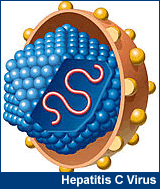 Direct-acting
antiviral drugs targeting various steps of the hepatitis C virus
(HCV) lifecycle are expected to bring about a new treatment
paradigm, especially for people with hard-to-treat HCV genotype
1. These agents will initially be added to standard
therapy consisting of pegylated
interferon plus ribavirin, but some are already being tested
in all-oral regimens.
Direct-acting
antiviral drugs targeting various steps of the hepatitis C virus
(HCV) lifecycle are expected to bring about a new treatment
paradigm, especially for people with hard-to-treat HCV genotype
1. These agents will initially be added to standard
therapy consisting of pegylated
interferon plus ribavirin, but some are already being tested
in all-oral regimens.
As described at the European Association for the Study of the
Liver's International Liver Congress (EASL
2011) this month in Berlin, Eric Lawitz and colleagues conducted
a Phase 2a clinical trial of ABT-450,
an HCV protease inhibitor jointly developed by Abbott and Enanta.
Prior studies showed that boosting with ritonavir (Norvir, developed
as an HIV protease inhibitor) increased ABT-450 plasma concentrations
and enabled once-daily dosing.
The present analysis included 35 treatment-naive chronic hepatitis
C patients randomly assigned to receive ABT-450/ritonavir or
placebo. About 70% were men, about 80% were white, and the average
age was 50 years; 80% had HCV genotype 1a. (Other participants
in the larger study received 2 other experimental agents, the
non-nucleoside HCV polymerase inhibitors ABT-072 or ABT-333.)
Participants received ABT-450/ritonavir at doses of 50/100 mg,
100/100 mg, or 200/100 mg once-daily, or placebo, as monotherapy
for 3 days, followed by 12 weeks of ABT-450/ritonavir or placebo
at the same dose in combination with 180 mcg/week pegylated
interferon alfa-2a (Pegasys) plus 1000-1200 mg/day weight-adjusted
ribavirin. After week 12, they continued on pegylated interferon/ribavirin
through week 48. Interim results from a planned analysis at
week 12 were presented at EASL.
Results
 |
During
the 3 days of monotherapy, response was similar in all 3
ABT-450/ritonavir dose arms, with a mean maximum HCV RNA
decrease of around 4 log IU/mL, compared with 0.36 log IU/mL
in the placebo group. |
 |
In
an intent-to-treat analysis at 4 weeks, 88% of patients
receiving ABT-450/ritonavir plus pegylated interferon/ribavirin
achieved rapid virological response (RVR; HCV RNA < 25
IU/mL) compared with only 9% in the placebo arm. |
 |
At
12 weeks, 92% receiving ABT-450/ritonavir vs 18% receiving
placebo achieved complete early virological response (cEVR,
again HCV RNA < 25 IU/mL). |
 |
No
participants receiving ABT-450/ritonavir plus pegylated
interferon/ribavirin experienced virological rebound during
12 weeks of therapy. |
 |
HCV
sub-genotype (1a or 1b), baseline HCV RNA, and IL28B gene
pattern were not associated with differences in virological
response. |
 |
Boosted
ABT-450 was generally well-tolerated and no novel adverse
events were observed. |
 |
Adverse
events and laboratory abnormalities were generally similar
in the ABT-450/ritonavir and placebo groups, and were consistent
with those of standard therapy. |
 |
No
drug-related serious adverse events were reported. |
 |
A
larger proportion of ABT-450/ritonavir recipient experienced
decreased neutrophil counts, but the average magnitude of
decrease was greater in the placebo arm; no patients discontinued
therapy due to neutropenia. |
"At week 12, a statistically significantly greater proportion
of subjects taking ABT-450/ritonavir + [pegylated interferon/ribavirin]
(92%) achieved complete early virologic response compared with
those subjects taking placebo + [pegylated interferon/ribavirin]
(18%)," the investigators concluded.
"When
combined with [pegylated interferon/ribavirin], ABT-450/ritonavir
was safe and well tolerated during 12 weeks of treatment, with
an adverse event and laboratory abnormality profile comparable
to that of [pegylated interferon/ribavirin] alone," they
added.
In
a separate analysis of 3-day resistance data, ABT-450/ritonavir
dosed at 200/100 mg "appeared to more consistently suppress
the emergence of ABT-450-associated resistant variants"
than the 2 lower doses, according to a press release issued
by Abbott.
"We
will continue to explore the use of ABT-450/ritonavir and our
other investigational HCV treatments in a variety of patient
populations and combinations, with and without pegylated interferon
alfa," said Scott Brun, MD, Abbott's divisional vice president
for infectious disease development.
Investigator
affiliations: Alamo Medical Research, San Antonio, TX; Abbott,
Abbott Park, IL; Cedars-Sinai Medical Center, Los Angeles, CA.
4/26/11
Reference
E Lawitz, I Gaultier, F Poordad, et al. ABT-450/Ritonavir (ABT-450/r)
Combined with Pegylated Interferon Alpha-2a and Ribavirin After
3-Day Monotherapy in Genotype 1 HCV-Infected Treatment-naive
Subjects: 12-Week Interim Efficacy and Safety Results. 46th
Annual Meeting of the European Association for the Study of
the Liver (EASL 2011). Berlin. March 30-April 3. Abstract
252.
Other Source
Abbott.
Abbott and Enanta Present Positive 12-Week Results and 3-Day
Resistance Data From Phase 2 Study of ABT-450/r for Treatment
of Hepatitis C. Press release. April 4, 2011.
